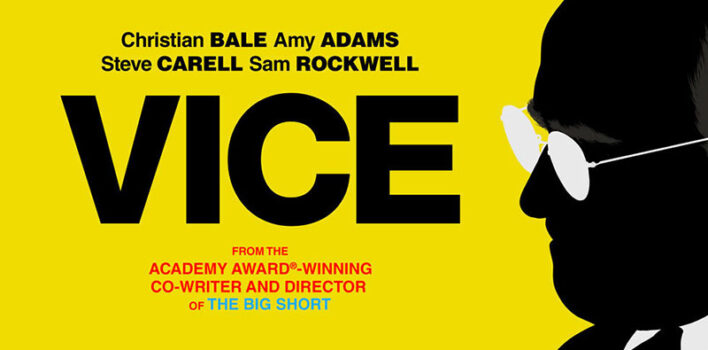Vice and the Struggle for Power
I recently stumbled upon yet another one of those YouTube videos I love so much where an expert dissects and explains scenes from movies that represent their expertise. “Expert reacts” videos are always interesting to me because they are revealing and educational, and provide an inside look at just how stupid many movies can be when it comes to portraying “realistic” scenarios. Heck, just Google how The Hurt Locker is woefully unrealistic, even though it won several Oscars. That’s just one example, but I’m sure you’ve caught yourself pointing at the screen like a DiCaprio meme muttering “that’s not how it works” before, depending on your experiences.
(I do that too, but not because I’m an expert on many subjects…
It’s because I’m a curmudgeon.)
That being said, I was weirdly struck during a “US president expert reacts to presidents in movies” video when I saw a clip of Christian Bale and Sam Rockwell as—get this—Dick Cheney and George W. Bush.
The movie was Vice.
Ok. I’ll bite…
What is this movie?
 Vice (2018, Plan B Entertainment) is the story of the Cheney family, Dick (Christian Bale) and Lynne (Amy Adams), along with their daughters, from the beginning of Dick Cheney’s political career in the early 1970s up to the present day. It’s a movie that focuses on Cheney’s shrewd and sometimes shady dealings with politicians and leaders throughout the decades, and how Lynne pushed her husband to amass as much influence and power with as much understated grace as possible. Over the years, we get an intimate peek into the ups and downs of Cheney’s political career, including his close relationship with Donald Rumsfeld and eventually President George W. Bush. We witness his magnanimous rise to prominence as the nation’s most powerful Vice President, which was thanks in part to the events of 9/11 and the “War On Terror”.
Vice (2018, Plan B Entertainment) is the story of the Cheney family, Dick (Christian Bale) and Lynne (Amy Adams), along with their daughters, from the beginning of Dick Cheney’s political career in the early 1970s up to the present day. It’s a movie that focuses on Cheney’s shrewd and sometimes shady dealings with politicians and leaders throughout the decades, and how Lynne pushed her husband to amass as much influence and power with as much understated grace as possible. Over the years, we get an intimate peek into the ups and downs of Cheney’s political career, including his close relationship with Donald Rumsfeld and eventually President George W. Bush. We witness his magnanimous rise to prominence as the nation’s most powerful Vice President, which was thanks in part to the events of 9/11 and the “War On Terror”.
This movie can come across as overly judgmental and kinda lopsided against the Cheney family, which probably shouldn’t be surprising to anyone who knows anything about the former VP. That’s why the narrator (played by the delightful Jesse Plemons, famous from his role as Todd in Breaking Bad) is vital to the film. He interjects during the narrative with wit and a somewhat polite, simpleton—esque tone, which gives the morally icky story some welcome grounding up against the unmagnanimous main character. The narration acts as a distinct counterpoint between the scenes, giving us the broad facts about just how unsavory the Cheney family really is. It works, even if it smells biased.
So, Vice uses clever narrative tools to tell the story of how a man of Dick Cheney’s temperament made a political career over the last 40+ years by working behind the scenes to orchestrate large scale events to further his own ends. That’s what this movie is about—how one man can attain a massive amount of political power, all the while being a “mild mannered” master puppeteer who often stays in the shadows. But is it a good movie?
I came into this film quite cold, knowing next to nothing about the actors or story, and even less about the true story of the Cheney family legacy. And I’m grateful that I had no lofty expectations.
The movie is not bad, but it’s far from masterful.
Director Adam McKay (Don’t Look Up, The Big Short, Anchorman) knows how to set up satire with finesse and colorful style. He’s a very good director, even if his biases are absolutely transparent in much of his work. Still, those biases are acceptable if you can anticipate them and try to keep an open mind.
McKay’s masterpiece is undoubtedly The Big Short (2015), a film that is perfectly paced, impeccably cast, unyieldingly engaging, funny, sad, exciting, and, most astoundingly, is solely focused on the American financial crisis of ‘07—’08. When I first watched that movie, based on the universally lauded book of the same name, I was blown away by just how incredibly fun, informative, and absorbing it was, not to mention deeply moving in a visceral yet grounded manner.
When I was in, like, 10th grade, my economics teacher had the whole class write a paper about the “housing bubble” of 2007, and why it was going to burst. So for this reason, I feel that I have a weirdly special connection to the financial bloodbath that ensued. This economic nightmare was all fueled directly by corporate greed and foolish carelessness that blindsided many, yet even my school teacher saw something bad coming. I was just a kid doing the assignment, but it was eerie to realize that I wrote about the housing market crash before it ever happened, with a chillingly accurate doom and gloom tone. I might have even gotten an “A”. Thanks mom.
The financial crisis and the events leading up to it are rarely the subject of vigorous debate amongst my friends and family, but The Big Short makes the ideas and stories just so darn relatable and understandable, and even the most unlikable characters come across as somewhat sympathetic.
I could go on and on about the movie, but suffice to say, that film demonstrates some of the greatest direction and filmmaking from McKay to date. Funny, relatable, superbly cast, unconvoluted, thoughtful, and immensely entertaining, TBS is a nearly flawless example of a great “based on a true story” style drama.
Unfortunately, Vice isn’t.
Mostly…
Somewhat.
Let me explain. Vice avoids being a straight up comedy while tiptoeing on the line between outright satire and serious, revealing biopic. This makes the movie a bit confused and scattered in its tone, but that’s not a very serious problem for someone like me. I kinda like movies that rapidly shift from point to point, character to character, much like TBS or even Spielberg’s Catch Me If You Can. That’s just how my attention span is with most “light hearted” popcorn movies anyways. All the President’s Men still held my attention, despite being “slow”, but the filmmaking more than made up for the lack of continuous excitement. These types of “true story” films must engage the audience in meaningful, understandable ways, without being scattered to the point of confusion, even if the real series of events can be convoluted. TBS doesn’t lose its thread at any point, despite it following three to four storylines simultaneously, peppered with rapid fire dialog and abrupt scene changes. It goes hard and fast and trusts the audience to keep up, to stay engaged.
Vice follows a somewhat similar (although more subdued) style of filmmaking. It’s focused on one man and his wife, and the forty something years they spend building power and influence in the US government. This life’s story of Cheney begins in the 1960s and progresses to the Obama administration, making the movie feel quite heavy with plot and quite accelerated in pacing. This leads to some competing areas of focus and depth within the film, leaving us as viewers feeling a little lost at times. But it’s not a “bad” story.
So let’s get the obvious stuff out of the way really quick; Christian Bale, as always, brings his “A” game to the lead role, and while I loathe a handsome actor in a fat suit, Bale still convinces me of his earnestness with his incredible talent. Cheney is portrayed as a subdued, seemingly mild mannered bureaucrat on the surface, when in reality he’s a cold and calculating leader willing to do what he must to gain and retain as much power as possible (legally? Eh, that’s debatable, but we’ll get to that later).
Sam Rockwell as President George W. Bush is just delightful, given that the charisma and looseness of the real former president seems to flow effortlessly in his performance. I’ve always loved Rockwell (Iron Man 2, Moon, The Green Mile) because he brings such exuberance and vitality to many of his mostly unconventional characters. Playing any POTUS in a movie is probably like walking a tightrope between outright mockery and grounded realism in the performance, and Rockwell is, as usual, perfectly balanced here.
Allow me to present some evidence:
Rockwell and Bale, along with Amy Adams and Steve Carell, are all perfectly capable in their roles. Jesse Plemons is a decent “voice of reason” narrator and brings some much welcomed youthful energy to the film.
The issue with this movie isn’t the acting or the casting. The acting, for me, often rescues some of the less engaging moments.
Let’s consider the plot:
We see Cheney start out in adult life as a directionless borderline—alcoholic who gets arrested and jailed for boozy shenanigans one too many times. His young wife gives him an ultimatum; either get it together and make something of himself, or get lost.
Dick then seems to effortlessly land a job as an assistant for presidential cabinet member and longtime politician Don Rumsfeld, who gives Dick the knowledge and experience he needs in the political arena. Dick eventually finds his way into a low level White House job sometime during the Nixon administration and starts to consolidate power over time. As CEO of an oil empire, White House chief of staff, and then eventually Vice President, Dick always seems to get ahead in life. Then, as the devastation of 9/11 changes the nation overnight, he pushes the president to invade Afghanistan and then Iraq, all the while building more wealth and power behind the scenes.
Vice isn’t a thriller. It’s also not satire, and it’s not really a serious biopic either. So what is it? It’s a film about how one man, along with his shrewd wife, can climb the political ladder and eventually gain and maintain almost a dictator’s level of power and influence. Vice is clearly not in favor of Cheney or his actions. There’s a really powerful scene where Dick breaks the fourth wall and attempts to defend his choices, and it’s chilling. The ambiguity of the “why” in Cheney’s life choices, his aspirations, and his morally questionable (and reprehensible) actions are all worth exploring and weighing. McKay says what he wants to say, no doubt, but it doesn’t wow me very much. Vice is acceptable, but falls short of greatness.
Obviously we as Christians must not be hasty to pass judgements, but from everything I’ve heard on the subject of Dick Cheney, he seems like a total slime—ball of a man. I feel that way about many past and present politicians, but Cheney seems to stand as one of the most hated government figures in recent history, along with Nixon and Trump (and that’s all we’re gonna say about Donald Trump! Haha… sigh.)
Also, Dick’s rise to prominence is fraught with all manner of sleazy meetings and back room deals. There’s an entire scene that chillingly portrays VP Cheney and his “inner circle” discussing who his allies and enemies in power are, where they are, and what they can do for him, like pieces on a chess board. It’s all a game of power and influence for Dick, and he intends to win at all costs.
Power and privilege; in this film, as well as in real life, it seems, are the only virtues our man Richard pursues. He also seems to love his small family, but isn’t above neglecting one daughter in order to support another, when push comes to shove. Which is another issue many people had with the real life Cheney, that is, he’s slimy and coldly pragmatic with almost everyone, even his own kids.
He was also a primary architect in some of our nation’s most unsavory wartime practices, being “often criticized for the Bush Administration’s policies regarding the campaign against terrorism, for his support of wiretapping by the National Security Agency and for his endorsement of ‘enhanced interrogation techniques’ which critics have labeled as torture.”
So, not a nice man. Not at all. And not well liked either, as he ended his tenure as VP with an abysmal 13% approval rating.
Yikes.
The Cheney family, for all practical purposes, has shown no signs of being Christian. This would mean that Dick Cheney is still an enemy of God, whether he knows it or not. And that’s what makes him an interesting figure to me, since he’s unrepentant and self—justified, and shows no signs of embracing Christ.
Theologically speaking, political power isn’t necessarily a bad thing to hold. The bible does tell us that true power is from God alone (Ephesians 6:14 and 3:16, Deuteronomy 8:17—18), but does not command us to avoid attaining or having earthly power, whether it be political, financial, or otherwise (see the story of Joseph in the book of Genesis, or the faith of the Centurion in the gospel of Matthew). But it’s a very tricky tightrope to walk between genuine humility and outright arrogance and abuse of power. This is why so many of our pastors and church leaders fail; they amass power, often without (seemingly) trying to amass power, and get built up by the Christians and the churches around them to be “great” men or women of faith. Then they sin, because they are repentant yet still sinners in a sinful world, and the once—clamoring crowds of supporters turn into people who have been let down and disenfranchised. So many Godly women and men seem to be built up only to be torn down by scandal, abuse, misconduct, and any other number of stumbling blocks. Why does this seem to be a continuous trend, specifically among Christian figures? The answer is nuanced and complicated, but, quite simply, it’s this: sin.
Just look at some famous “conservative” Christians, like Kent Hovind or even R. C. Sproul Jr., and there’s no doubt that seemingly great men can sin greatly. King David, a righteous and mighty man after God’s own heart, sinned many times during his illustrious life in many heinous ways. That doesn’t make men like David mere monsters; it makes them fallible humans. Therefore, we must avoid assumptions that a well known person of faith exists on some higher spiritual plane than the rest of Christianity. We must also be cautious to not conflate repentant sinners (like pastors who make mistakes and then turn around to try and right their own wrongs, which includes repentance and sometimes stepping down from positions of authority) with truly evil, unrepentant sinners (like Cheney, or any woman or man who refuses to acknowledge their own evil acts before others and God).
Cheney, while he may not be a paragon of Christian virtue, was and is a man of incredible power and influence. He used his status for personal gain, and not for morally righteous causes, so his fallibility as VP is evident to any thoughtful Christian who holds the law of God in high esteem (not for nothing, when I say “law of God”, I’m speaking about the entirety of scripture, which is inerrant and complete). Yet, many men of faith were also morally despicable at one point or another. Abraham was a lair. Moses was a murderer. Job was arrogant and self—righteous. Isaiah was prideful. Peter denied Christ. St. Augustine was a philanderer. Martin Luther was vehemently anti—Semitic.
The list goes on and on.
We all fall short, which is why Christ is so near to our suffering and our failures, to guide and to comfort us broken, sinful people. Thankfully The Lord does not abandon us to our follies, but gives us His Holy Spirit to guide and comfort us in times of tribulations. Humans don’t deserve God’s love, because by nature we are all enemies of God, until He changes the heart of a sinner and turns the sinner into a ransomed soul for Christ’s sake.
Let me be clear here; what Cheney did should never be chalked up to some “failures” or “follies” in his career. These are grievous sins and evil; yes, God can apply the blood of Christ to them, but they are still evil, evil acts and the wrath of God is against them.
“We are not sinners because we sin. We sin because we are sinners!”
–R. C. Sproul Sr.
That is, our human nature is depraved and we will always struggle with sin in this life, no matter how holy we might try to be. That includes the sin of neglecting God in pursuit of power, wealth, influence, and prominence.
Power, then, can be extremely dangerous to possess or pursue.
And we see this very clearly explained in Luke 18:16—25, and, as you read it, you can add the word “power” alongside the word “wealth”, for rarely does anyone possess one without the other:
“But Jesus called them to him, saying, ‘Let the children come to me, and do not hinder them, for to such belongs the kingdom of God. Truly, I say to you, whoever does not receive the kingdom of God like a child shall not enter it.’
And a ruler asked him, ‘Good Teacher, what must I do to inherit eternal life?’
And Jesus said to him, ‘Why do you call me good? No one is good except God alone. You know the commandments: ‘Do not commit adultery, Do not murder, Do not steal, Do not bear false witness, Honor your father and mother.’
And he said, ‘All these I have kept from my youth.’
When Jesus heard this, he said to him, ‘One thing you still lack. Sell all that you have and distribute to the poor, and you will have treasure in heaven; and come, follow me.’ But when he heard these things, he became very sad, for he was extremely rich.
Jesus, seeing that he had become sad, said, ‘How difficult it is for those who have wealth to enter the kingdom of God! For it is easier for a camel to go through the eye of a needle than for a rich person to enter the kingdom of God.’”
Wealth and power are often synonymous, and this rich ruler probably had both. Yet he would not enter into the Kingdom because of his greed and his need to possess that which he loved most.
Loving Christ means, by definition, forsaking the world, and therefore forsaking all the wealth and power it has to offer. We don’t hate our own lives or our neighbors, but we do need to despise the fleeting pleasures and vapid trappings of this earth.
You need not be destitute in order to love God, and you need not be wealthy in order to hate God, but the principle of Christian living is simply to love God and HIS kingdom above all else. Christ came to save the lost, and I was once lost without Him, following the gleaming temptations of this world with all my might. Money, power, pleasure, all these things I loved more than Jesus. And, while money, power, prestige, pleasure, and security are not inherently sinful, desiring these things above God is dangerous to the soul.
But what of Christ? Does He not desire that we attain power or wealth here on earth?
Yes and no.
“Thy will be done, not mine”. God has given some of my brothers and sisters in Christ immense blessings of material wealth, health, influence, and security in this life. And that’s amazing! I truly want them to be blessed by these temporal things. But they know just as well as I that these fleeting pleasures are not ultimate. When Christ comes back to claim His bride, He will not come quietly. All will be cleansed by fire, and this earth will be remade. I often think about just how unbelievable this truth is;
That Jesus is coming back with the sword to END everything, start over with HIS people on HIS new heavens and new earth.
All created things will melt before the might of our God and His cleansing power.
We also understand that God will make the powerful weak, and take away their authority when He returns, unless they are repentant of their sins and enter into His eternal kingdom. See Matthew 20:16, where Jesus clearly says:
“So the last shall be first, and the first last: for many be called, but few chosen.”
As well as in the book of Revelation chapter 19, when Jesus returns to judge the earth:
“He was clothed with a robe dipped in blood, and His name is called The Word of God. And the armies in heaven, clothed in fine linen, white and clean, followed Him on white horses. Now out of His mouth goes a sharp sword, that with it He should strike the nations. And He Himself will rule them with a rod of iron. He Himself treads the winepress of the fierceness and wrath of Almighty God.”
Scary imagery, but it’s in the Bible, and God says His word is truth. We best be prepared to meet Christ when He returns.
Because He won’t be coming in peace.
Jesus, the just judge of all creation, not only judges wickedness, but also saves those who he chooses as sheep for his flock. The Bridegroom (Christ) joyfully selects His Bride (the church, all those who follow Christ) to be saved from the divine wrath of God the Father, cleansed from all unrighteousness, and redeemed by being grafted into the family of God. All of this will culminate in a glorious wedding feast in celebration of the bride of heaven being presented fully and finally to her eternal Husband, the divine man, Jesus Christ the Lamb. The book of Revelation is a dense, symbol laden work of apocalyptic writing, and is not an easy book to understand. But John the apostle, the writer of the book, is very clear about those who will inherit eternal paradise alongside Jesus for eternity, as Jesus Himself declares:
“I, Jesus, have sent My angel to testify to you of these things for the churches. I am the root and the descendant of David, the bright morning star. The Spirit and the bride say, ‘Come.’ And let the one who hears say, ‘Come.’ And let the one who is thirsty come; let the one who desires, take the water of life without cost.”
John also saw this vision of a New Heaven and a New Earth, where God and man live in perfect unity and peace:
“And I heard a loud voice from the throne, saying, ‘Behold, the tabernacle of God is among the people, and He will dwell among them, and they shall be His people, and God Himself will be among them, and He will wipe away every tear from their eyes; and there will no longer be any death; there will no longer be any mourning, or crying, or pain; the former things have passed away.’”
–Revelation 22:16—17, Revelation 21:3
We can take comfort in the overwhelmingly glorious promises of Jesus in the bible, where he confirms again and again that the wicked will be destroyed, and the righteous who live by faith will be granted eternal life with Him. Let’s always be mindful of our status as citizens of the kingdom of heaven, and be joyful in the hope we have in our savior Christ Jesus. Living like Cheney, or any other earthly ruler, hungry for power and greedy for influence, unapologetic for using wicked means to justify unsavory ends, is a guarantee of a miserable existence, likely in this world and certainly in the next.
It’s not pleasant to imagine, but hell is full of men and women who loved power, status, wealth, and pleasure more than they ever loved God or their fellow humans.
We mustn’t join them.
So, with a firm grasp on our theology, we can safely say that the pursuit of power, and a life lived in service of personal political gains over genuine morality is a life ultimately wasted. Did Cheney live like this? It’s likely true that he did to some extent, and still does. He seems even now to reject any sense of regret for the shady or unethical things he’s done in his life of public service, and unless he repents, is destined for a dark fate that awaits men like him.
In conclusion, the movie, along with the life it is based upon, have much to teach us, if we are willing to look deeper at the subtext of the pursuit of power, fortune, and influence. The film is worth watching, and the conversion it tries to start is worth having.
So, if you enjoy American political drama and history, you’ll likely enjoy Vice. That’s what originally drew me into the film in the first place, and that’s what kept me engaged for two hours. If that sounds awful and boring to you, you won’t like Vice. Elderly makeup effects, Method acting, and big budget set pieces aside, Vice is a solid film.
But be warned—the good folks at RogerEbert.com hated the movie! And I have to agree with this quote from their one—and—a—half star review:
“All I know is that Cheney deserved an acidic, smart movie that’s as unforgettable as his political career. My politics may not align with his, but even I can recognize that his legacy doesn’t deserve something as toothless as Vice.”
Ouch.
That said, McKay’s movie is worth checking out. All told, it is really just the sordid story of a man going too far, and the system that let him get away with it all.







